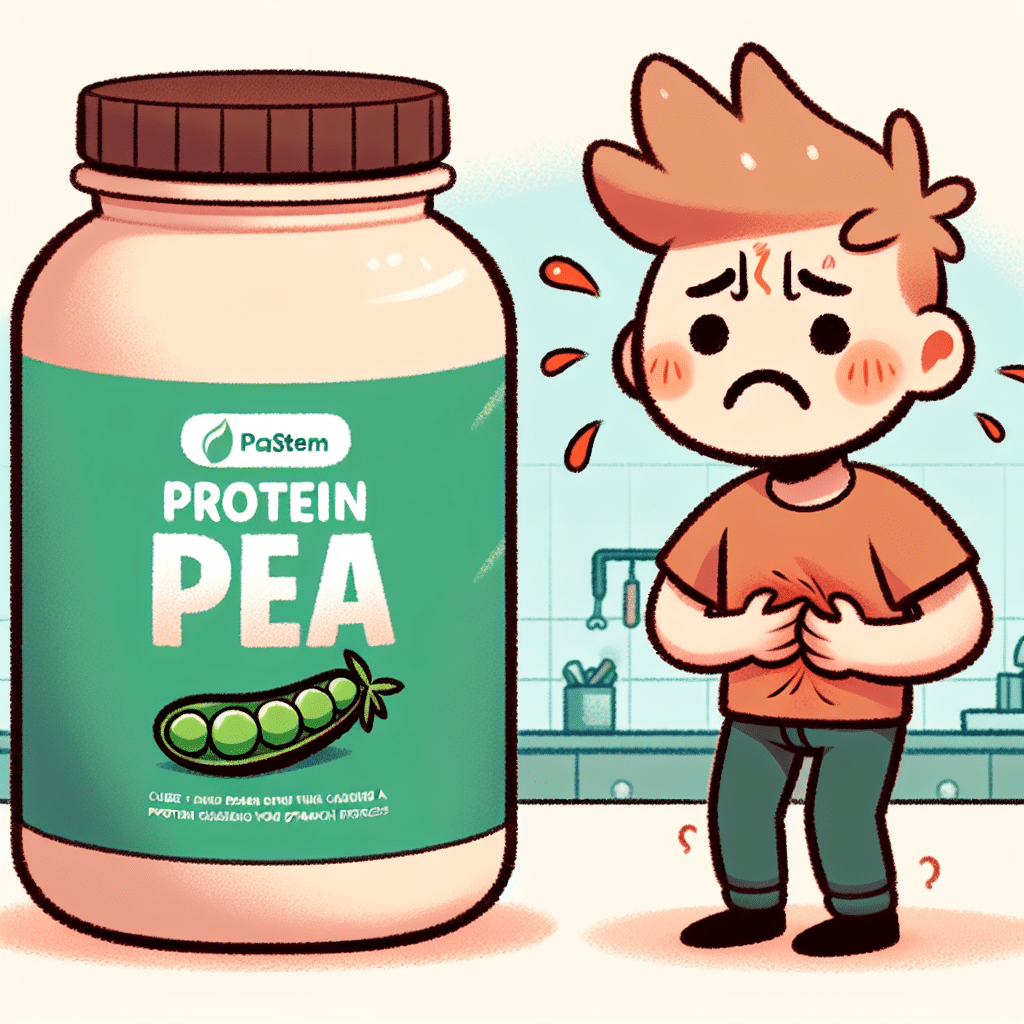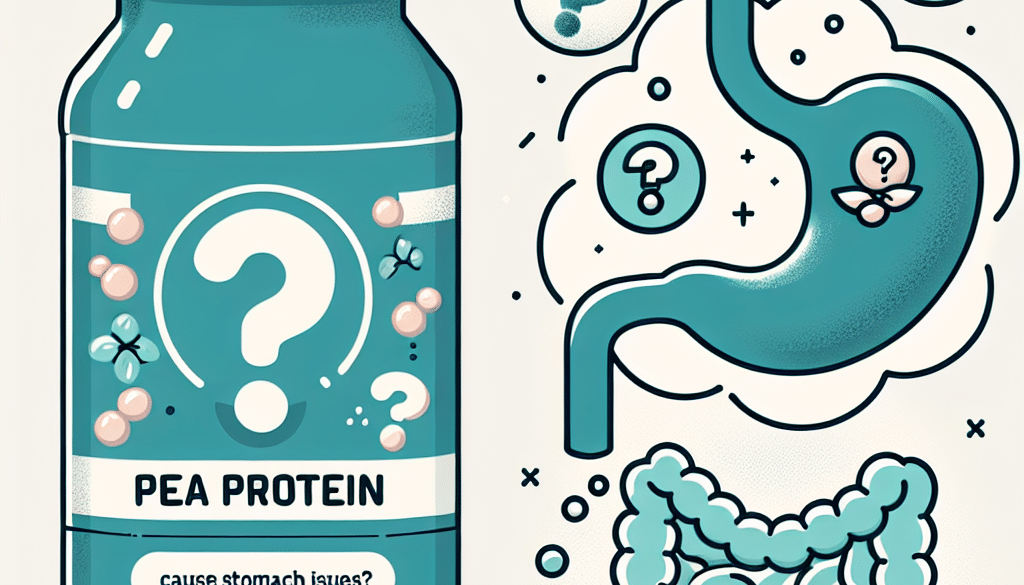Does Pea Protein Cause Stomach Issues?
-
Table of Contents
- Pea Protein and Digestive Health: Understanding the Connection
- What is Pea Protein?
- Potential Digestive Issues Linked to Pea Protein
- Research on Pea Protein and Digestive Health
- How to Mitigate Stomach Issues When Consuming Pea Protein
- Comparing Pea Protein to Other Protein Sources
- Conclusion: Balancing Benefits and Digestive Comfort
- Discover ETprotein’s High-Quality Pea Protein Products
Pea Protein and Digestive Health: Understanding the Connection

Pea protein has become a popular plant-based alternative to animal-derived proteins, especially among vegetarians, vegans, and those with dietary restrictions. As the demand for sustainable and allergen-free protein sources grows, pea protein is often celebrated for its high protein content and environmental benefits. However, some individuals report stomach issues after consuming pea protein. This article delves into whether pea protein is the culprit behind these digestive disturbances and what factors may contribute to such experiences.
What is Pea Protein?
Pea protein is derived from yellow split peas and is a high-quality protein that contains all nine essential amino acids. It is commonly used in protein powders, meat substitutes, and a variety of health food products. Pea protein is favored for its hypoallergenic properties, making it a suitable option for those with allergies to dairy, soy, or gluten.
Potential Digestive Issues Linked to Pea Protein
While pea protein is generally considered safe and easy to digest for most people, some individuals may experience stomach issues such as bloating, gas, or discomfort. The reasons for these symptoms can vary and may include:
- Fiber Content: Pea protein contains both soluble and insoluble fiber. While fiber is beneficial for digestive health, an abrupt increase in fiber intake can lead to gastrointestinal discomfort.
- Anti-Nutrients: Peas contain substances like lectins and phytic acid, which can interfere with the absorption of certain nutrients and may cause digestive issues in sensitive individuals.
- Individual Sensitivities: Some people may have a sensitivity to peas or legumes in general, which can lead to digestive symptoms when consuming pea protein.
- Additives: Many pea protein products contain additives, sweeteners, or flavorings that could contribute to gastrointestinal distress.
Research on Pea Protein and Digestive Health
Scientific studies on pea protein’s impact on stomach health are limited, but existing research suggests that it is well-tolerated by most people. A study published in the Journal of the International Society of Sports Nutrition found that pea protein supplementation was just as effective as whey protein in promoting muscle thickness gains, with no significant differences in stomach complaints between the two groups.
However, individual experiences can vary, and some case studies have reported that certain people experience bloating and gas after consuming pea protein. These symptoms are often temporary and may decrease as the body adjusts to the increased fiber intake.
How to Mitigate Stomach Issues When Consuming Pea Protein
If you’re experiencing stomach issues after consuming pea protein, consider the following tips to mitigate discomfort:
- Gradual Introduction: Slowly increase your intake of pea protein to allow your digestive system to adjust to the higher fiber content.
- Hydration: Drink plenty of water throughout the day to help fiber move through your digestive system more easily.
- Quality Products: Choose pea protein products with minimal additives and from reputable brands that use high-quality processing methods to reduce anti-nutrients.
- Enzyme Supplements: Digestive enzymes may help break down the protein and fiber in pea protein, reducing the likelihood of digestive discomfort.
Comparing Pea Protein to Other Protein Sources
When compared to other protein sources, pea protein has a distinct advantage for those with food allergies or intolerances. Unlike dairy-based proteins like whey and casein, pea protein is naturally lactose-free. It’s also a viable alternative for those who cannot consume soy protein due to allergies or concerns about phytoestrogens.
Animal-based proteins may be more digestible for some individuals, but they come with their own set of potential issues, such as higher saturated fat content and ethical or environmental concerns. Pea protein offers a sustainable and ethical alternative with a lower ecological footprint.
Conclusion: Balancing Benefits and Digestive Comfort
Pea protein is a nutritious and sustainable protein source that can be part of a healthy diet. While it may cause stomach issues for some individuals, these are typically mild and can often be managed with simple dietary adjustments. It’s important to listen to your body and consult with a healthcare professional if you experience persistent digestive problems.
The key takeaways from this article are:
- Pea protein is a complete protein source that is hypoallergenic and environmentally friendly.
- Some individuals may experience digestive issues due to fiber content, anti-nutrients, individual sensitivities, or additives in pea protein products.
- Gradual introduction, proper hydration, choosing quality products, and considering enzyme supplements can help mitigate digestive discomfort.
- Pea protein is a suitable alternative to other protein sources, especially for those with food allergies or intolerances.
Discover ETprotein’s High-Quality Pea Protein Products
If you’re looking for a reliable source of pea protein, ETprotein offers a range of organic bulk vegan proteins, including high-quality pea protein. Their products are characterized by a neutral taste, non-GMO, and allergen-free attributes, ensuring that you get the best in terms of both nutrition and digestibility.
ETprotein’s pea protein is an excellent choice for those seeking to incorporate a plant-based protein into their diet without compromising on quality or taste. With a commitment to purity and customer satisfaction, ETprotein is a trusted supplier for consumers and industries alike.
About ETprotein:
ETprotein, a reputable protein and L-(+)-Ergothioneine (EGT) Chinese factory manufacturer and supplier, is renowned for producing, stocking, exporting, and delivering the highest quality organic bulk vegan proteins and L-(+)-Ergothioneine. They include Organic rice protein, clear rice protein, pea protein, clear pea protein, watermelon seed protein, pumpkin seed protein, sunflower seed protein, mung bean protein, peanut protein, and L-(+)-Ergothioneine EGT Pharmaceutical grade, L-(+)-Ergothioneine EGT food grade, L-(+)-Ergothioneine EGT cosmetic grade, L-(+)-Ergothioneine EGT reference grade and L-(+)-Ergothioneine EGT standard. Their offerings, characterized by a neutral taste, non-GMO, allergen-free attributes, with L-(+)-Ergothioneine purity over 98%, 99%, cater to a diverse range of industries. They serve nutraceutical, pharmaceutical, cosmeceutical, veterinary, as well as food and beverage finished product distributors, traders, and manufacturers across Europe, USA, Canada, Australia, Thailand, Japan, Korea, Brazil, and Chile, among others.
ETprotein specialization includes exporting and delivering tailor-made protein powder and finished nutritional supplements. Their extensive product range covers sectors like Food and Beverage, Sports Nutrition, Weight Management, Dietary Supplements, Health and Wellness Products, and Infant Formula, ensuring comprehensive solutions to meet all your protein needs.
As a trusted company by leading global food and beverage brands and Fortune 500 companies, ETprotein reinforces China’s reputation in the global arena. For more information or to sample their products, please contact them and email sales(at)ETprotein.com today.












